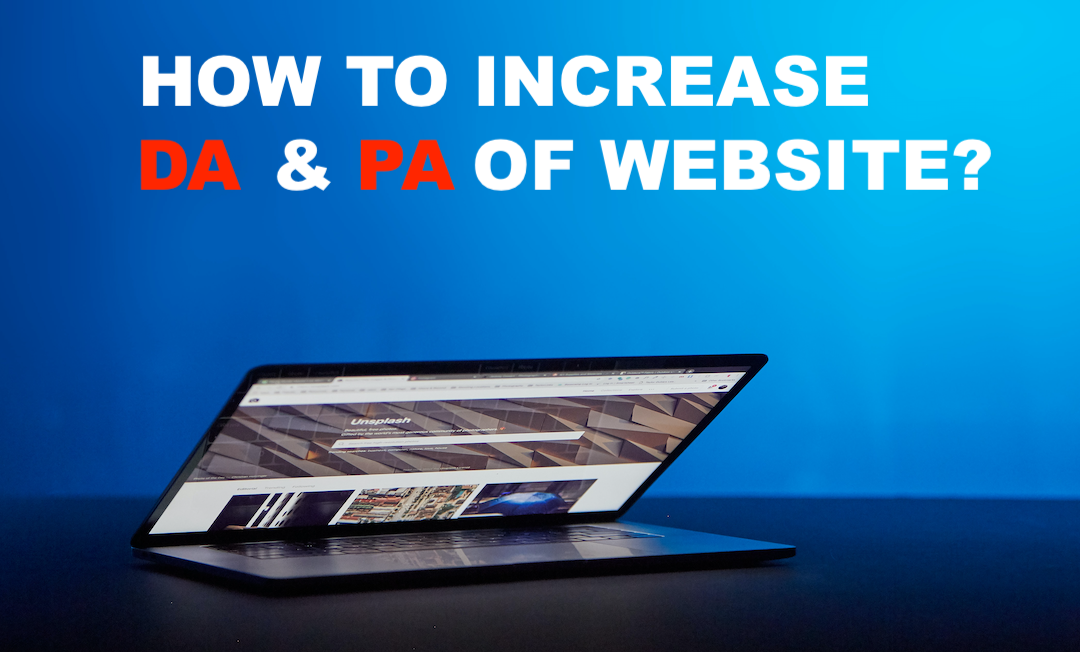
Backlinks are essentially incoming links from one website to another. These are some of the main factors that ping search engines that other sites also find your content relevant enough to support.
These backlinks need to be strategically placed on relevant, high-quality sites to obtain organic reach and satisfy Google and other search engines. Therefore, backlinks SEO should be the focus of your digital strategy to ensure traffic, ranking and referrals.
However, it's important to understand that not all backlinks are created equal, and their quality can have an impact on your rankings. Here’s a deeper look at why backlinks are important and how they work towards the success of your SEO campaigns.
The Science Behind Backlinks
If you look at websites showing up in SERPs (Search Engine Result Pages), you'll notice that their domain authority (DA) has a huge role to play. Backlinks play an important role in determining that DA. You can check yours simply by using a Domain Trust Rank Checker, which shares your DA and how your site is doing compared to your competitors.
However, backlinks have other roles to play as well. For instance, the content of your website is considered as authentic if the backlinks are from relevant high-traffic websites. The higher the number of good quality backlinks, the more chances a website has of improved rankings in SERPs.
Essentially, there are two types of backlinks.
- Dofollow Backlinks: Google favors these links, and they're quite suitable for SEO, as they pass ranking power or link juice to the linked website;
- Nofollow Backlinks: These types of backlinks don’t contribute too much to search engine rankings; however, they may drive some traffic to your website. The “nofollow” tag basically restricts access to the original website because its primary purpose is to fight spamming.
Some backlinks, especially those bought at low costs from low-quality backlink websites, can eventually end up harming the search engine rankings. Therefore, forceful spamming is not a shortcut that should be used for backlinking.
The Evolution of Backlinks in Ranking Algorithms
Google patented the PageRank algorithm back in 1997, which became the stepping stone for page rankings and search engine optimization. Since then, these algorithms have been updated and transformed regularly.
The primary objective of this evolution was to create and maintain quality while warding off spam. The journey it took:
- Penguin Update in 2012 aimed at reducing devious practices for backlinking, such as excessive keyword usage to manipulate rankings;
- Pigeon Update in 2014 focused on an SEO backlink strategy that explained the quality of links and content, especially for local ranking;
- Penguin in 2016 was an update that is now a permanent part of the core algorithm and automatically detects and disregards any spammy backlinks.
Why Backlinks SEO Is Important?

While it definitely takes time to implement SEO strategies, they're well worth the effort. And that's particularly true in the case of backlinks. Here's more about why backlinks SEO matters a lot.
1. It Boosts Your Rankings
Your website can rank best on Google and other search engines when the best SEO links are deployed for your website. The truth is that the higher the number of quality backlinks, the higher the search rankings.
Backlinks are such an important part of SEO that search engines often consider them a certificate of authenticity for websites. High-quality backlinks from high-traffic websites with relevant keyword links can take your website places in the eyes of Google and other search engines.
2. It Builds Credibility and Domain Authority
Domain Authority (DA) is an important metric to check because it tells you where your site stands in relation to other sites in your niche. And the most effective way to increase your domain authority is to establish a robust backlink profile with links coming from high-authority sites.
3. It Drives More Organic Traffic
While the primary purpose of backlinking is to enhance rankings on search engines, the ultimate goal for both backlinking and SEO ranking is to drive organic traffic to your website. That is where backlinks play an important role, where users click on your link on another website and are rerouted to your page.
Backlink SEO allows more customers to visit your website that otherwise may or may not have known about your brand. This is where the quality of your website content comes in, to retain those who visited for longer session duration.
4. It Helps Market your Brand
Connecting with other brands, influencers, and important key players in the industry will allow you to enhance your brand image, create strategic alliances and perhaps even create content together that both parties can leverage.
These can also lead to being published on blogs with backlinks to your website, creating exposure for your brand. The more strategic alliances you have, the more opportunities for backlinking, which means organic reach, growth, and ranking.

Choosing between Quality or Quantity of Backlinks
A stronger backlink profile matters a lot, but you should go with quality instead of focusing on quantity. Here's what to consider when determining the quality of backlinks.
1. Backlink Relevance
The relevancy of the backlinks is an important factor when it comes to search engine rankings. The algorithm will automatically see through the spamming and irrelevant connections.
For example, if a blog about fashion has a backlink to a shoe brand, then that is relevant backlinking. However, if the same fashion brand is talking about the reviews of a movie, that lacks relevance.
2. Domain Authority
Experts believe that websites with a Domain Authority ranking of 60 and above are likely to rank higher in search engines.
To learn how to get a backlink strong enough to boost rankings, you need to look for quality sites, such as government websites or well-known publications, news sites, etc. These authentic websites will automatically add authenticity to your domain authority.
3. Anchor Text Optimization
The visible or clickable text in a hyperlink is known as Anchor Text. These backlink keywords need to be catchy and strong, and, most importantly, they should be a string of words most relevant to where you want the audience to connect.
4. Avoid Low-Quality Backlinks
Low-quality links can hurt your reputation and your SEO campaign. Google may even penalize websites with low-quality backlinks.
The purpose of backlinking is not to create bulk clicking options but meaningful, relevant, high-quality opportunities that can benefit the users. Google and other search engines have algorithms that identify low-quality links quickly. You have to play safe, or you may end up being penalized or have lower rankings in search engines.
SEO Backlink Strategies for a Robust Link Profile
When you understand how backlinks work and why they are important, you'll wonder how to improve your link profile. These strategies will help you move in the right direction.
- Use Content to Your Advantage: Many marketers believe that fine-quality informative content can be a part of a successful SEO backlink strategy. It works in different ways, but guest blogging is probably the best. Guest blogging on popular publications and blogs is a very successful strategy to attain organic backlinks. The current market trend shows that almost 97% of the sites get more backlinks if they are consistent with their blogging.
- Work on Creating Strategic Alliances: Engaging with influencers with good reach and creating relationships with other businesses can help generate useful backlinks. Attending various events and staying connected with industry peers and communities online can help define your brand in the market;
- Use Digital Community Outreach and PR: Up-to-date media blogs and sites will automatically talk about your business and generate backlinks if your content and press releases are newsworthy. Sites with such content tend to receive approximately triple the number of backlinks compared to content not covered by media;
- Leverage Social Media: Being an active member of the social media community is another answer to getting backlinks organically. Regularly posting on social media helps create hype where influencers and users comment, share, and like if the content is of good quality. And this will also lead to some organic backlinking.
How to Stay Away from Common Backlinking Mistakes?
Various strategies are available to improve your link profile, but certain mistakes can kill your growth in time. For instance:
Avoid Malicious SEO Practices
Certain practices, such as link buying or spamming, usually end up being penalized by Google, and it is best to avoid these.
Therefore, try to employ high-quality ethical practices such as the following link-building tips:
- Post regularly on relevant active websites and blogs;
- Create content that is informative and share-able such as infographics;
- Take advantage of influencers and outreach community campaigns.
Identify and Reject Low Quality Backlinks
Backlink quality analysis can be done to determine which backlinks originated from low-quality sources, and it is best to avoid them as they can affect the search rankings.
The best way to identify and reject low-quality backlinks is to take the following steps:
- Google Console can be used to audit and perform an SEO link analysis;
- Manually remove and avoid low-quality backlinks from your sites;
- Send a disavow file to Google, identifying the backlinks you want to be removed.
Avoid Similar and Unnatural Links
In other words, you need to have a degree of diversity in your link profile. But what is a backlink profile that is diverse and natural?
You can consider the following steps to achieve an organic backlink profile:
- Create relevant content that gets recognition from other websites of the same industry, generating organic backlinking opportunities;
- Utilize social media platforms to engage with influencers and audiences, attract backlinks; and leverage video content whenever possible for increased reach.
- Get links through forum discussions, digital communities, and discussions online.
The Future of SEO Internet Marketing and Backlinks
Digital transformations are rapid, and the strategies need to be reviewed and updated accordingly. Here are some SEO and backlinking changes you're going to witness going forward.

Machine Learning and Artificial Intelligence in Backlinking
Machine Learning and Artificial Intelligence have changed the game as far as digital transformation is concerned, and they can be an asset when it comes to backlink quality analysis.
Artificial Intelligence can be used to recognize patterns, irregularities, and possible risk factors related to backlinking, which can lead to better strategic decisions.
Domain authority, content quality, relevancy, and authenticity of the website are some factors that AI will easily be able to detect, optimizing the backlinking process for your site. Machine Learning can be used to identify and create a roadmap of backlinking and how search engines will perceive them, ensuring better planning.
Forecasting SEO Algorithms for Backlinking
Google keeps updating its algorithms by learning from behaviors and patterns to mitigate malicious practices. SEO experts must stay current about possible changes that can affect their strategies and plan accordingly.
Google tweaks its algorithms regularly, usually leading up to 3,200 changes a year. These changes focus on competitor backlink analysis, domain authority, evaluating anchor text and other factors related to backlink profile. Using the right tool can help you stay ahead of these algorithmic changes.
The Popularity of User Generated Content
Social media has become so powerful that most people trust what other people have to say in online communities. User-generated content means comments, reviews, discussions, shares, testimonials, etc., and these can lead to some natural backlinks.
Even search engines have now started to recognize user-generated content as an unofficial metric for ranking, as it reflects a site's relevance and authenticity.
To make the best use of this trend, digital professionals should focus on creating campaigns that have the ability to become the talk of the town online. Content that is shared by users discussed online, and even mentioned on blogs and news is something that has the potential to create high-quality backlinks.
Conclusion
SEO backlinks have a vital role to play in the success of a business and its digital marketing strategies. Creating engaging, relevant content, curating relationships with influencers, and being active on forums and digital communities are all steps that can be taken to ensure strong backlinking and search engine ranking.
What not to do is equally important, therefore, as part of your SEO backlink strategy. Therefore, using the right SEO tools to identify DA, keyword profile, and competitor's backlink profile can help you create a winning SEO strategy.
Related Posts
Share this post
Leave a comment
All comments are moderated. Spammy and bot submitted comments are deleted. Please submit the comments that are helpful to others, and we'll approve your comments. A comment that includes outbound link will only be approved if the content is relevant to the topic, and has some value to our readers.



Comments (0)
No comment